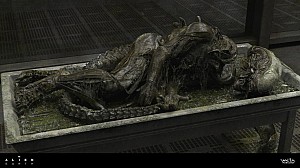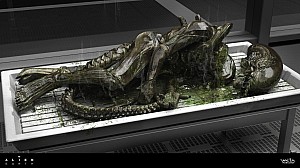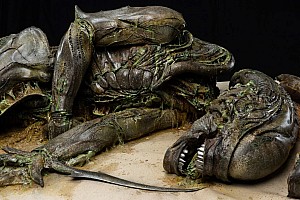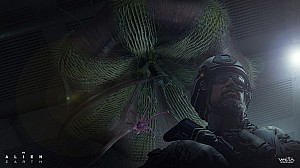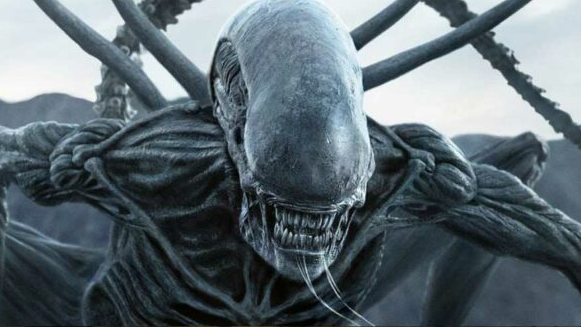Back to my favorite theory!!!
Prometheus Forum Topic
deftones1986
MemberOvomorphJul 7, 20121269 Views15 RepliesThis is my favorite theory as to what Ridley Scott wanted to tell us throught this movie, and MOST IMPORTANTLY through scrapping the original script, and choosing Lindelof to write.
Click-->[url=http://mysite.verizon.net/ffaller/Heads%20and%20Tails.htm]Heads and Tails: Paradox in the Word of God[/url]
*Link made clickable by Svanya
Replies to Back to my favorite theory!!!
Hey Guest, want to add your say?

David 1July 07, 2012
Paradoxes are great because they can't exist. The Universe seems to hate them.
[b]Ask nothing from no one. Demand nothing from no one. Expect nothing from no one.[/b]
deftones1986July 07, 2012
It's all about how we can't seem to figure this movie out because
THATS WHAT LIFE IS.
We can't all join together as one and come to one single conclusion as to every single question ever asked. It just can not happen, there are always one other side to the story, there are always questions left to be answered, there are always things that make sense, there are always things that don't make sense, life is not ever meant to be FULLY understood. Because in order to be fully understood, it would involve every human to come to the same exact conclusion, but look all around you, every person has differences, even twins, even people who believe in the same religion, look around this website, everybody, even those who believe the same theories, have something a little tiny bit different to add.
Everybody would have to be wired exactly the same way, have exactly the same thoughts, be in exactly the same coordinates, be born the same, look the same, feel the same, etc.....
But then everything would just cancel itself out, so the explanation is there, but it's not there.
There was no way whatsoever to make the perfect movie, so Ridley decided:
"THAT IS THE POINT I AM GOING TO MAKE"
There is no real definition of truth because each person holds their own version of the truth in their minds.
"There is nothing in the desert ,and no man needs nothing."
"Big things have small beginnings."
"Beauty is in the eye of the beholder."
"One mans trash is another mans treasure."
" This sentence is true. Every man is a liar."
"This statement is false."
"1,000,000 grains of sand is a heap of sand.
A heap of sand minus one grain is still a heap"
Get the point?
All these sentences can be interpreted in an infinite amount of ways.
Just like religion, just like the question of where we came from, just like the events in Prometheus.
And all the interpretations will not ever lead to one definite answer, noting my above paragraphs.
Life: It's all about the perspective of each individual living thing from humans, down to microscopic organisms, no perspective is the same, no matter how hard you try and make it.
This is my theory and I'm sticking to it!!!!!!!!!!
Until Ridley proves me wrong!
deftones1986July 07, 2012
The universe is a paradox if you think about it. If the universe came in to existence, then what was before it? If there was nothing before it, than how can that be? there had to be something before that, and before that, just like the Russian doll concept has to do with Engineers and who created them, and who created that......
My point is that this is the point that the director is trying to make, he wants the movie to no make sense, therefore it does make sense.

David 1July 07, 2012
": It's all about the perspective of each individual living thing from humans, down to microscopic organisms, no perspective is the same, no matter how hard you try and make it."
I don't know if you ever read Baruch de Espinoza [aka Bento de Espinoza], but if you haven't I think you would like his works very much.
One in particular called ETICA [or ETHICS] in which he uses the [i]Mos Geometricum[/i] [a severe logic aproach] and tries to answer the nature of God, Man and Nature it self.
Somewhere in his Etica he talks about paradoxes [though giving them another term].
Also you'd love Fichte's works and his Subjectivity aproach.
[b]Ask nothing from no one. Demand nothing from no one. Expect nothing from no one.[/b]
deftones1986July 07, 2012
I will definitely look in to that. But at the same time I think I should take a break from this site because it's starting to take away from other productive things I should be doing hahah!!!

David 1July 07, 2012
deftones1986:
lol. It's a matter of ballance my friend. :D
[b]Ask nothing from no one. Demand nothing from no one. Expect nothing from no one.[/b]

allinambercladJuly 07, 2012
"I think I should take a break from this site because it's starting to take away from other productive things I should be doing hahah!!!"
Presumably that is then a, "paradox", rather than a simple matter of fact.

deftones1986July 07, 2012
The following is a good read trust me! And it furthers my theory.
This also fits into my theory of everything being about the PERSPECTIVE of the individual. Read this and then think of the relationships between:
Weyland and Everybody else.
Humans and The Engineers.
Humans and The Black Goo.
The Engineers and The Black Goo.
Nietzsche: On the Genealogy of Morals
I. First Essay
Nietzsche begins with a story of how the terms 'good' and 'bad' got their meaning: Originally, there were two kinds of people--"the noble, the powerful, the superior, and the high-minded" and the "low, low-minded, and plebeian." The former had an unquestioning hold over the latter--they had a feeling of ruling and superiority that was justified by the fact that they were ruling and they were superior. Nietzsche calls this feeling of the superior over the inferior the pathos of distance. He thinks that it is through the pathos of distance that 'good' and 'bad' first acquired their meaning. That is, 'good' was associated with those who were superior, noble and privileged, while 'bad' was associated with those who were common, plebeian, and low.
However, descendants of the lower class began to resent being so powerless; they began to resent being bad. Their hatred toward the superior class resulted in a "radical transvaluation of their values." That is, 'good' and 'bad' began to reverse in meaning such that 'good' now applied to the common, low, poor and powerless, while 'bad' now applied to the superior, privileged, rich, and powerful. In this way, the deprived, poor, sick, and helpless become pious, whereas as the powerful, noble, and rich became impious. This transvaluation of values is possible when the ressentiment of the lower classes for the superior becomes so great that they find compensation only in imagining or creating a different moral code. It is this creation of an opposing moral system that Nietzsche calls the slave morality. So in order for the powerless to feel better about the situation that they are in, they create for themselves a morality--a slave morality--where they, the powerless, are 'good,' while their superiors, the powerful, are 'bad.'
*A Quick Note on Part 13*
It is here that Nietzsche presents the analogy of the lambs and the eagles. The lambs may not like that the eagles take off with one of them from time to time, but it would be ridiculous for the lambs to blame the eagles for doing what they do. This would be just as bad, Nietzsche thinks, as the eagles blaming the lambs for doing what they do--namely, sitting there waiting to be eaten. Nietzsche claims: "To demand of strength that it should not express itself, that it should not be a will to overcome, overthrow, dominate, a thirst for enemies and resistance and triumph, makes as little sense as to demand of weakness that it should express itself as strength."
As with the lambs and the eagles, so too with human beings. According to Nietzsche, the strong and superior can no more resist being strong and superior than the weak and inferior can resist being weak and inferior. At root of this idea is the belief that there is no distinction between strength (or weakness) and the expression of strength (or weakness). As he puts it, "...the doing itself is everything." One of the main problems with the slave morality, Nietzsche thinks, is that it assumes the exact opposite of this--that is, it assumes "that the strong may freely choose to be weak." Nietzsche thinks that strength just is doing strong things; weakness just is doing weak things. So the thought of tempering or taming strength, would just result in one becoming weaker; likewise, beefing up weakness, would just result in one becoming stronger.

Red WolfJuly 07, 2012
Whew!
OK... Listen, paradoxes are great if you're trying to bed a sophomore co-ed from your philosophy class after dinner and a nice merlot or if you're attempting to keep billions of people wondering/debating the existence of a God that no science has been able to prove or disprove.
But if you're trying to solidify your place in Hollywood sci-fi lore and make enough $$ to do so AFTER 2012, I suggest RS/20th Century Fox stick to the tried-n-true method of telling a story -- it can even be an intricate story -- that "the masses" can grasp, maybe even embrace... and leave the paradoxical high-wire acts for the hormone raging college student and cerators of all that we know to be and exist.
Just my 2 cents anyway.
deftones1986July 07, 2012
Exactly @ Red Wolf. It is your opinion or your "2 cents"
And you just keep proving my point even more if I don't mind quoting myself:
"Life: It's all about the perspective of each individual living thing from humans, down to microscopic organisms, no perspective is the same, no matter how hard you try and make it."
"There is no real definition of truth because each person holds their own version of the truth in their minds."
"The universe is a paradox if you think about it. If the universe came in to existence, then what was before it? If there was nothing before it, than how can that be? there had to be something before that, and before that, just like the Russian doll concept has to do with Engineers and who created them, and who created that......"
Do neither of those three points hold any ground?
Does it not make sense to you at all?
To even begin to argue against my points would be you arguing against everything that exists in the world today, and has existed.
Humans used to believe the Earth was flat, and then they changed their theories and realized the Earth was round.
Humans used to believe religion as the biggest answer to lifes questions, and then things changed and now science is becoming more and more widely accepted is it not?
Some people believe in Buddha, some believe in Jesus, Some believe in Darwinism, Some believe in Jehovah.
And even all those people that collectively believe in either of those religions, without expressing it.....has their own mini-version of that exact religion in order to make their life seem meaningful.
Just think about the overall concept and you'll see that I can only be wrong about it being the reason behind the movie. But in no way am I wrong that it doesn't make sense within life itself and human culture.
aircraftfixerJuly 07, 2012
Wow!
And I thought that watching Prometheus gave me quite the headache. Now I get it- where the headache originated...
Bible lessons aside, I would very much like to have seen what Spaihts script would have looked like on the screen instead. I might perhaps have been entertained.
But getting a headache vs being entertained could be a paradox now wouldn't it?

RubirosaJuly 08, 2012
The paradox is really the pathos of intellectual life and just as only great souls are exposed to passions it is only the great thinker who is exposed to what I call paradoxes, which are nothing else than grandiose thoughts in embryo.
Soren Kierkegaard (1813-1855) Danish philosopher and writer.
ZMAN3494July 08, 2012
Great thread and very interesting points everyone. I am going to have to look into some of these references you guys are making.
Are you an avid Alien fan looking for a dedicated online community of likeminded fans? Look no further! Create your own profile today and take part in our forums and gain XP points for all the content you post!


